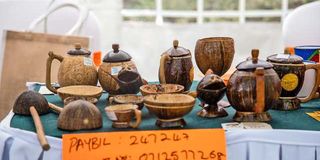Premium
Creativity: Fatuma Mohammed mints profit from coconut shells

Ms Fatuma Mohammed displays a kettle she made. Fridah Okachi | Nation Media Group
Entrepreneurship affords most businesspeople an avenue to make their millions by taking raw materials and turning them into high-value items.
In Mombasa County, 34-year-old Fatuma Hassan Mohammed with a degree in Information and Communication Technology is making money out of coconut shells by turning them into kitchen utensils and sports trophies.
The mother of one was among Kenyans who lost their jobs in 2020 during the Covid-19 pandemic—a dire time — and was hence forced to stay at home.
Before the pandemic, Ms Mohammed was working as an ICT manager in an organisation in Mombasa. From losing a job during a pandemic viewed by many with a negative impact, she saw an opportunity of how to use raw materials to make money.
“When I received an email that I was losing my job, I felt confused and did not mind anything. After some time, being in the house used to feel lonely. At times, I used to ask myself: “How could such an well-educated person like me become jobless?”
“I kept thinking about what I could do to raise some money for my family. That's when the idea of making spoons for serving soup or porridge came into my mind,” she added.
Coconut shells
She said she started collecting coconut shells and made a few spoons. She knocked from one door to another, and neighbours supported her by buying all of them. Earning good profits for a day encouraged her to make more, including sports trophies targeting clubs.
“I didn't settle for one product only. Where I am, a lot of sports activities take place, some of the clubs wanted trophies delivered to their members,” said the entrepreneur.
However, during that time Ms Mohammed didn't own a machine as she does now. Therefore, she used a knife to make the products.
Coconut shells are normally considered as waste, so Ms Mohammed cleans up the environment, through her work, by collecting them. She does this with the help of her three workers who have been assigned to collect and take them to her shop.

Some of the products are made of coconut shells.
Ms Mohammed said that she does everything possible to please her customers, and asked that other educated, yet unemployed individuals in the country consider creative ventures like hers.
“Creativity has its rewards if you satisfy your customers with the designed products. There are so many raw materials that are not used in this country, which you can use to create very profitable items just by adding your creativity to the things with minimal investment,” she said, as she encouraged other youths who are looking for a job opportunity.
Most of the products made by using coconut shells depend on their size. Ms Mohammed uses the shell to make jugs, cups, or large or small bowls by peeling and smoothening the shells.
“There's double profit in this. When I get the coconut shell, first I scrape and smoothen the shells with dry sandpaper. Then I provide a second treatment with sandpaper using water. Afterwards, I clean and decorate them according to need with either strings or glue,” she further explained.
She said the business was worth it. With the help of a non-governmental organisation known as Somo Africa, she owns a shop which provides business training for the youth. Usually, the organisation advises or assists them by opening shops for them and connecting them to banks that give them loans at low interest rates.
Creativity
“I had a burning desire to have a shop where my customers can find my products. I approached a non-governmental organisation that gave me three months of training. Later, they provided me with funds to buy machines that would ease my work; this was challenging at first,” she said.
After four years of profitability from this creativity, the entrepreneur now holds high hopes of expanding, and eventually selling her products abroad.
Ms Mohamed can now hire six people who help her.
“I have a team of six artisans. Three young boys move around in the streets to collect the shells, which are my raw materials. In my workshop, I have three assistants who clean and shape the items according to customers’ requests or ideas that I present,” she said.
Her business is popular among foreign visitors to the county. She sells items at various prices, ranging from Sh400 to Sh3, 000.
“I make a good income every month, enabling me to pay my workers and cover my personal needs. The rest I save, for you never know what tomorrow will bring,” Ms Mohamed said.
Even though the business is profitable, its operations heavily rely on special occasions for increased sales.
“Foreign customers value the quality, appearance and durability of the shell, but locals clients want me to sell it to them cheaply. They only consider where I source the shells from,” Ms Mohamed said.





